Killer Radio: Toxic music and toxic behavior?
By Bryan Crawford -Contributing Writer- | Last updated: Mar 14, 2017 - 11:07:01 AMWhat's your opinion on this article?
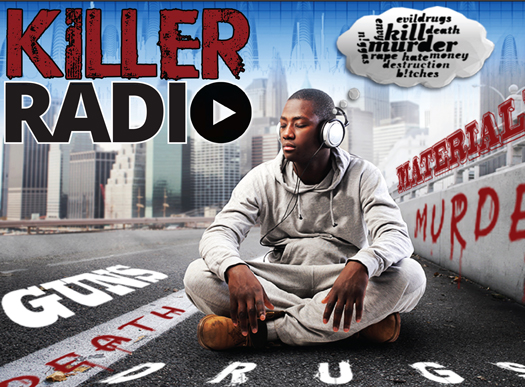
|
Campaign aims to shutdown music helping to feed Black self-destruction
CHICAGO—In the Black community, where the majority of listeners tune into radio stations that have branded themselves as “urban,” many are dangerously unware of the harmful and detrimental impact the music is having on the minds of the young people who tune-in.
In a digital age where any musical content you desire can be accessed at the push of a button, or within a few keystrokes, radio is still one of the most prevalent and powerful mediums when it comes to broadcasting and communicating to people.
Every day, millions tune into their favorite stations in their homes, cars or places of business.
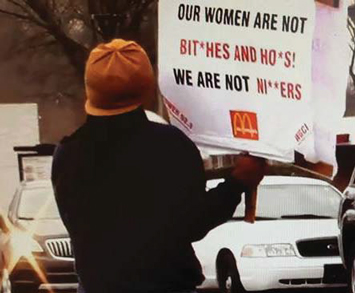
Photo: Clear the Airwaves project/Facebook
|
The “Clear the Airwaves” project was founded by Chicago native Kwabena Rasuli. He has made it his mission to try and force radio stations to understand the harm they’re inflicting on young Black boys and girls, as well as men and women, through a non-stop, 24/7 barrage of negative lyrical imagery—which he refers to as “death musick”—particularly from those in the hip-hop genre. Mr. Rasuli has staged protests in front of Chicago’s primary urban music radio stations, as well as in front of the businesses of some of their biggest sponsors and advertisers, in an effort to draw attention to the problem and get both parties to recognize the harm being done to Black youth.
“I go way back with this fight, starting from when I first heard the Geto Boys, Scarface and a lot of that other crap from the early ’90s—what they call the Golden Age of hip-hop—because of how violent, vulgar and ratchet it was,” Mr. Rasuli told The Final Call. “Now we’re to the point where 90 percent of the stuff being played on the radio today is violent, vulgar and ratchet. It’s having a detrimental effect on the masses and has been for a long time. But right now, it just seems like it’s out of control.”
Two of the Chicagoland areas biggest FM urban radio stations are Crawford Broadcasting-owned Power 92 (WPWX), and iHeart Radio’s WGCI. Both stations are go-to’s in the Black community for the latest musical content, which at times can feel as if you’re listening to the same CD on repeat because the music and songs that both stations play are basically identical.
When it comes to hip-hop, “trap music” is the most popular subgenre with artists like Future and The Migos being the most popular artists. However, there are other artists, such as YFN Luchi, 21 Savage and Kodak Black who are gaining more notoriety and radio airplay as they move more into the mainstream.
But regardless of who sings the songs, the content is virtually the same: It primarily promotes prescription drug use, gun violence, promiscuity, misogyny and other self-destructive and negative behavior that manifests itself daily within the Black community.
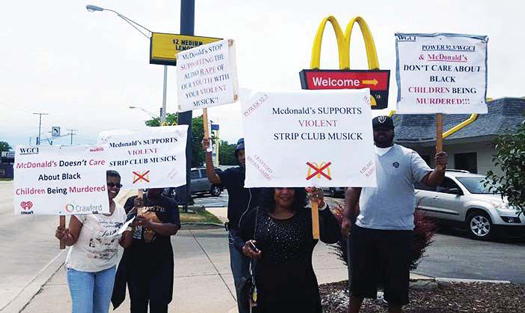
Demonstrators concerned with the graphic lyrical content of music Chicago urban radio stations broadcast, have targeted local businesses that advertise on those stations in efforts to address the problem. Photos: Clear the Airwaves project/Facebook
|
What makes this even more damaging, however, is the fact that most people who listen to the music aren’t even aware of the ways in which they’re being influenced by it. However, this dynamic certainly isn’t lost on those who make the music.
“If I’m riding around listening to ‘Commas’ [by the rap artist Future] and I’ve got a bankroll in my pocket, say $10,000, then you can’t tell me I’m not gonna blow it because like the song says, ‘F--- up some commas.’ That’s the mood it puts me in and I’m gonna do it,” said Spenzo, a rapper from the South Side of Chicago’s who’s hit song “Wife Er,” was a chart topper several years ago. The young emcee fully understands the dangers associated with the music and the culture that he, and others like himself, have immersed themselves in and made a lucrative career out of.
“I’m not Chance The Rapper, I’m not gonna lie. He makes positive music and he does it so well and all of it is good spirited. There’s a lot of artists out here that make that kind of music,” Spenzo explained. “But I’m a product of Englewood, Roseland and Stateway [Gardens]. I’m a product of that violence. Like drill music; it’s called that for a reason. I blame Chief Keef—that’s my friend and my homie—for that era, but he knows what he did sparking up the beef between the GD’s [Gangster Disciples] and the BD’s [Black Disciples]. Music played 100 percent in that—and in a lot of other stuff that’s going on out here—because it’s like a fuel.”
Music influencing listeners to engage in negative and destructive behavior has been called part of an anti-Black conspiracy and some readily dismiss that—based solely on the premise that they just enjoy the music. However, to hear a young rapper like Spenzo who is not only deep in the industry, but the culture itself, confirms music can have a positive or negative influence on life.
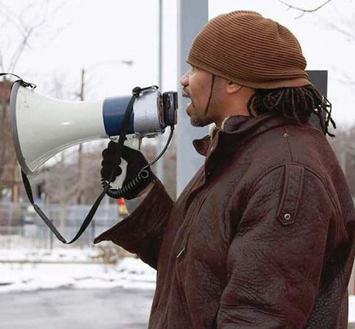
Activist Kwabena Rasuli
|
Additionally, to hear him credit music and its ability to incite violence among young people whose minds are already impressionable, is more or less the exact reason why Kwabena Rasuli’s fight against urban radio stations is so important.
“People don’t understand how important it us for us, Black people, to take more control over our music,” Mr. Rasuli said. “We hope that we reach a tipping point somewhere, and you think it would be when little kids and young babies are being shot dead in the streets. The two-year-old who was killed when the young lady was streaming on Facebook Live, if you saw that video what kind of music were they listening to? It’s like a mental illness. Fred Hampton, Jr., said to me once that when you have all of this toxic music, why are people surprised that it creates toxic behavior? It goes hand in hand.”
Some might say that even if urban radio stations were to completely alter their programming and remove all negative music from their rotations, it would do no good because people could just go on their phone or computers and listen to it online. While this may be true, it still doesn’t undermine or delegitimize the power that radio has when it comes to reaching the masses.
“It’s not a question of hardware. This is a struggle on the level of ideas. And radio is still the primary supplier of ideas in society, as well as the Black community,” Bob Law, a legendary radio broadcaster and social activist who has spent decades of his life in the industry, told The Final Call.
“Radio is so convenient—it’s in your car, your office, your kitchen, you can even get radio stations through your cellphone. It’s in the background, so you don’t have to stop what you’re doing to listen, unlike TV or videos, which demands that you pay full attention to it to observe what’s going on.”
Mr. Law says he recognized the power of radio to have a positive or negative influence on people in the early ’70s with the release of the movie “Super Fly” and its accompanying soundtrack, which achieved greater success than the film. People who listened to the album’s title track weren’t affected by Curtis Mayfield lamenting that Super Fly knew that selling drugs was wrong. All many heard was the character’s name being glamorized in accordance with the movie portrayal of a Black drug dealer who lived a lavish lifestyle, but was trying to get out and go in a different direction in life.
“At the time, I was working with young kids trying to either get them off drugs or keep them away from it altogether, and that soundtrack made the job so difficult because it romanticized cocaine use and drug dealing,” Mr. Law said. “Super Fly did some sinister things, but the kids identified with him and were so enraptured by him because he made being a coke dealer fashionable. And that song was all over the radio. I wasn’t in radio then, but I realized how powerful it really was and can be. I went to the local radio station in New York and asked them to stop playing that song because it was damaging to our drug counseling work, and they took it off.”
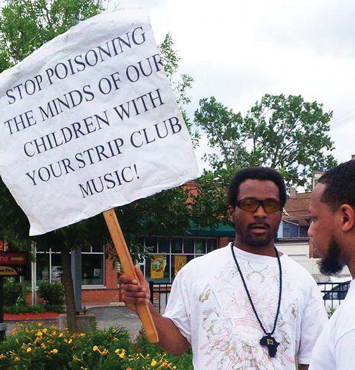
Local activists are concerned with content in many rap lyrics.
|
Unfortunately, radio executives today aren’t nearly as sympathetic.
Several years ago, Kwabena Rasuli took a meeting with local Chicago radio execs who oversee WGCI and Power 92. He said he pleaded with them to pull violent music, or at least balance it out with a more diverse variety of songs. But, he said, the request fell on deaf ears when he was told the stations generally play what the people want to hear.
“Whenever we have Clear The Airwaves Project protests, I’d say almost half the people who come out and are curious of what this fight is about, aren’t even aware of how the garbage coming across the airwaves is affecting them,” said Dwight Taylor, a Chicago native who lives in Northwest Indiana and also heads Concerned Citizens Against Violence in Gary. “If they’re parents, they don’t even realize what their kids are listening to. When I was coming up, we had homicides and murders just like every generation does, but we didn’t have music like this, with these garbage lyrics, that we’re hearing today. I believe in my heart that this music is playing a major role in the mortality of young people and how they’re just methodically killing each other off with no remorse.”
“The music being played today is far more damaging now than it was before,” added Mr. Law. “The messaging is much more detrimental and promotes mass genocide, murder, degradation, immorality, drug and alcohol abuse. All of this stuff is romanticized musically … the promotion of violence, disrespect of women and killing as the solution to problems in the street. But the irony is this music is being deliberately concocted by those who hate Black people in order to drive us into self-destructive behavior. And the fact that Black people are doing it, just shows how much Black people hate themselves. But the music is at the root of all of it.”
Mr. Rasuli understands that the onus is just as much on the artists who create the music as it is the radio stations that play it. But he also understands that it could be unrealistic for a rapper who has made his fame and fortune from a negative subgenre of hip-hop music, to change his tune, so to speak. He feels the real answer to the problem is that people come together and realize how detrimental this kind of music is to Black youth.
“We understand the conditions that we’re living in. We understand that the masses of Black people, whether they’re artists or just fans of the music, are asleep and we have to wake them up,” Mr. Rasuli said. “We know it’s a struggle and we know this enemy, this beast, has a lot of power and these artists make a lot of money. Bobby Shmurda got $2 million to push that poison he made. What young person his age is going turn that kind of money down?
“It gets frustrating because when it comes to radio, all you’re exposed to is the ratchet stuff and that’s not the only music that’s out here, but you wouldn’t know that if the radio won’t play it. We know there’s a lot of conscious artists out here and if you expose a young person to that kind of music, if they want to be a rapper and they hear that kind of music on the radio, it could encourage them to make the same kind of music. We could end all of this tomorrow if we just came together and it’s up to the adults—whether you’re a parent of a child or even an artist—to get together and understand what’s going on out here because this music is killing our babies. It’s mind debilitating.”
Related news:
Protestors picket home of BET president
Women's coalition launches 'Respect Me!'campaign
INSIDE STORIES AND REVIEWS
-
-
About Harriett ... and the Negro Hollywood Road Show
By Rabiah Muhammad, Guest Columnist » Full Story -
Skepticism greets Jay-Z, NFL talk of inspiring change
By Bryan 18X Crawford and Richard B. Muhammad The Final Call Newspaper @TheFinalCall » Full Story -
The painful problem of Black girls and suicide
By Charlene Muhammad -National Correspondent- » Full Story -
Exploitation of Innocence - Report: Perceptions, policies hurting Black girls
By Charlene Muhammad -National Correspondent- » Full Story -
Big Ballin: Big ideas fuel a father’s Big Baller Brand and brash business sense
By Bryan Crawford -Contributing Writer- » Full Story






 Click Here Stay Connected!
Click Here Stay Connected!








